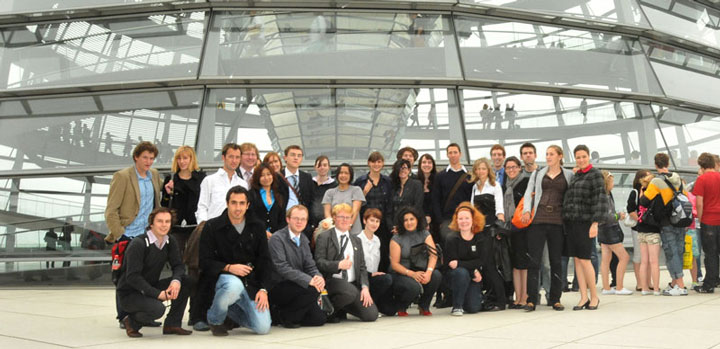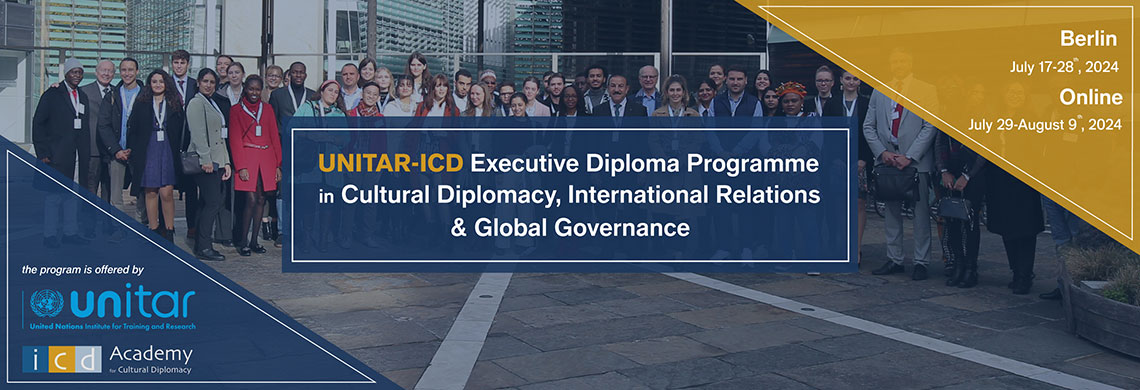Young Leaders´ Forums
Cultural Diplomacy in Europe

Report of Day 1: Music as Cultural Diplomacy and Fête de la Musique
In the morning, the Cultural Diplomacy in Europe forum was opened by the Program Director Matthies Verstegen. Following his brief introduction the participants were introduced to the concepts of Leadership Initiatives and Young Leaders by Peter Rees. The participants were made aware of the importance of such initiatives and how they can be of benefit to those they influence, no matter how small.In the afternoon, Peter Bijl, founder of the Flachland Fest, presented an initiative taking place annually in Berlin which illustrates the theme of Music as Cultural Diplomacy. The Flachland festival brings together Dutch and Flemish bands to showcase their music on Berlin stage. Bijl, who started with just the idea, managed to secure some external finances to make his idea become reality. Bijl discussed his concept, his marketing ideas and the barriers he encountered along with how he managed to overcome them in various innovative ways. Participants were presented with how a small idea could snowball into something considerable.
The opening day coincided with the Fête de la Musique, an international music festival started in France. The group visited Rosi’s, one of Berlin’s most renowned music venues in Kreuzberg and got a first-hand experience of Berlin’s famous music scene.
Report of Day 2: Cultural Diplomacy Explored, and a visit to the Europäisches Haus
At the Amerika Haus, the morning of the second day of the Young Leaders' Forum began with the lecture "An Introduction to Cultural Diplomacy" from ICD Director and Founder Mark Donfried. This introduction outlined the development of cultural diplomacy into one of the most important fields of international relations and its uses, from both past and present, giving an insight into institutions such as the Alliance Française, dating back to 1883 and the German Goethe Institute. The participants were informed on the need for cultural diplomacy and then considered the definitions of culture and diplomacy. Mr. Donfried finally talked about the difference between advertising, propaganda, and cultural diplomacy, the agents and vehicles used, and the target audience.The afternoon seminar on the subject of "The European Commission and the EU" took place in the Europäisches Haus and was hosted by Willem Noë from the Directorate General for Communication of the European Commission. Mr. Noë began with the European enlargement timeline, followed by an explanation of exactly what the EU is and what it does, concluding with why new states want to join and what the costs and benefits are to member states. Questions were posed throughout concerning European borders and the possibility of Turkish accession to the EU.
Later in the afternoon, Mr. Verstegen mediated a European Parliament role-play where a hypothetical new institute was to be set up by the EU. Groups of three or four were encouraged to take on the role of certain countries in order to bargain for their conflicting national interests. In the end, a decision was reached and certain concessions had to be made.
Report of Day 3: The Polish Institute and a Speech on European Integration
Tuesday's events began with an afternoon at the Polish Institute, where the forum group were introduced to the Polish Institute’s work by Marcin Zastrożny. Mr. Zastrożny’s presentation talked about how such institutes bring Polish arts, film and music to different countries around the world. He discussed their role as a governmental institute as an information provider to the Berlin community and not to the Polish one. The group could also see the current exhibition at the Institute which displays a photography from a Polish artist.Afterwards, back at the Amerika Haus, the CDE forum participants completed a workshop in different approaches to cultural diplomacy in Europe. This was orchestrated by the forum moderators and gave the participants a chance to generate a wide range of ideas and engage in group discussion on approaches to culture as an instrument for diplomacy.
Later that evening, Karl-Erik Norman, former Swedish Ambassador and Secretary General of the European Cultural Parliament, gave a lecture entitled "Culture as a pillar of European Integration".
Report of Day 4: Cultural Diplomacy in the context of EU Enlargement
The day began with a lecture in the Amerika Haus on the subject of "The perception of history as a dividing factor in Europe's East- West relations" from Dr. Zsuzsa Breier, former Cultural Attaché for the Hungarian Embassy. Dr. Breier focused on the question of the divided memory within Europe asking what Europeans have learned from history for their future. She discussed the lingering tendency to glorify Communism and posed some questions to the participants about the East-West divide.In the afternoon, a second lecture followed. Dr. Marc Helbling, senior researcher at the Social Science Research Centre Berlin in the research unit for Migration, Integration and Trans-nationalization, spoke on "Reactions of European societies to Migration from a comparative perspective". He spoke about both inward and outward migration to and from Germany, focusing on the migration of Germans into Switzerland and on the Turkish communities in Germany.
Later in the day the participants took part in a workshop on leadership initiatives, overseen by the CDE moderators. This was a chance for the groups to come up with ideas for organising their own cultural exchange initiatives when they leave Berlin; they organised these for a presentation on the final day of the forum.
In the evening a pub quiz was held at the Eastern Comfort to test the participants' general knowledge of the E.U.
Report of Day 5: Visit to the German Foreign Ministry, the Guggenheim, and the Hungarian Embassy
On the penultimate day of the forum the participants visited the German Foreign Ministry, and were given a presentation on the work of the Foreign Office both in Germany and abroad, focusing especially on the department's Foreign Education and Culture Policy. In 2008, a total of 658 million euro was spent on cultural policy. This is allocated to teaching German, to scholarships, partner schools abroad and in general to promote a positive image of Germany in the European integration process. Much of the funding is not spent directly by the Foreign Office, but goes to intermediary bodies, for example the Goethe Institute. The talk, given by Foreign Office desk officers Anne Duncker and Florian Jaeger, was followed by questions from the CDE forum participants.After lunch, the group visited the Deutsche Guggenheim and after looking round the exhibition, the ICD's Dr. Sabine Lang hosted a discussion on "Art as Cultural Diplomacy". Examples of topics debated were: art as a personal experience vs. a public, shared experience; art's potential to humanize rather than polarize; how art’s use of emotion connects people, and art as a means of combining political messages into a cultural forum.
This was followed by a visit to the Hungarian embassy. The spokesperson, Laszlo Nyaradi, gave a presentation on Hungary's foreign presence in terms of cultural diplomacy. The country is promoted abroad by cultural institutes (independent of the embassies) in a total of 18 countries. Mr Nyaradi also spoke about the strength of the Hungarian- German connection both before and after the end of the GDR (East Germany).Later that evening, the forum came back to the subject of art as they explored the Kunsthaus Tacheles, a giant ramshackle complex of independent artist's studios in a former department store on Oranienburger Strasse and a central part of the art and communication scene in Berlin.
Report of Day 6: Discussion and Presentation of Future Initiatives
The CDE forum participants got the chance to present their leader initiatives this morning. Many interesting approaches to cultural diplomacy were presented. Some groups explored the possibility of using this year's 20th anniversary of the fall of the Berlin wall to organise a series of commemorative events, adapting them respective to the various countries in which they would be shown. Another group proposed using economic migration as cultural dialogue. To promote better understanding between immigrants and "natives" - their example was the Polish population in Ireland - they suggested creating an exhibition using photographs, where the Polish people told their own story. Other concepts went further afield and explored setting up cultural exchanges between Europe and Asia. Mark Donfried attended the event as moderator and was on hand to give advice on the leadership initiatives.In the afternoon the participants were welcomed at the Bundestag (German Parliament) by Samad Hussain, Mr. Hussain is one of the top advisors for German Migration Policy. He spoke very matter-of-factly about German feelings towards immigration, about the causal factors for migration and the problems it can cause. Following his speech, he gave a tour of the Bundestag ending at the famous new glass dome.
In the evening the participants said farewell, but with a resolve to work towards future initiatives in the framework of the CDE.


























































